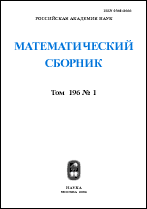|
This article is cited in 5 scientific papers (total in 5 papers)
Convergence of Fourier double series and Fourier integrals of functions on $T^2$ and $\mathbb R^2$ after rotations of coordinates
O. S. Dragoshanskii
M. V. Lomonosov Moscow State University
Abstract:
Let $f(\xi,\eta)$ be a function vanishing for $\xi^2+\eta^2>r^2$, where $r$ is sufficiently small, and with Fourier series (of the function considered in the square $(-\pi,\pi]^2$) or Fourier integral (of the function considered in the plane $\mathbb R^2$) convergent uniformly or almost everywhere over rectangles. It is shown that a rotation of the system of coordinates through $\pi/4$
$$
\begin{cases}
\xi=(x-y)/\sqrt 2\,,
\\
\eta=(y+x)/\sqrt 2
\end{cases}
$$
can “damage” the convergence of the Fourier series or the Fourier integral of the resulting function.
Received: 10.01.2000
Citation:
O. S. Dragoshanskii, “Convergence of Fourier double series and Fourier integrals of functions on $T^2$ and $\mathbb R^2$ after rotations of coordinates”, Sb. Math., 191:11 (2000), 1587–1606
Linking options:
https://www.mathnet.ru/eng/sm496https://doi.org/10.1070/sm2000v191n11ABEH000496 https://www.mathnet.ru/eng/sm/v191/i11/p3
|


|




 Contact us:
Contact us: Terms of Use
Terms of Use
 Registration to the website
Registration to the website Logotypes
Logotypes







 Citation in format
Citation in format 
